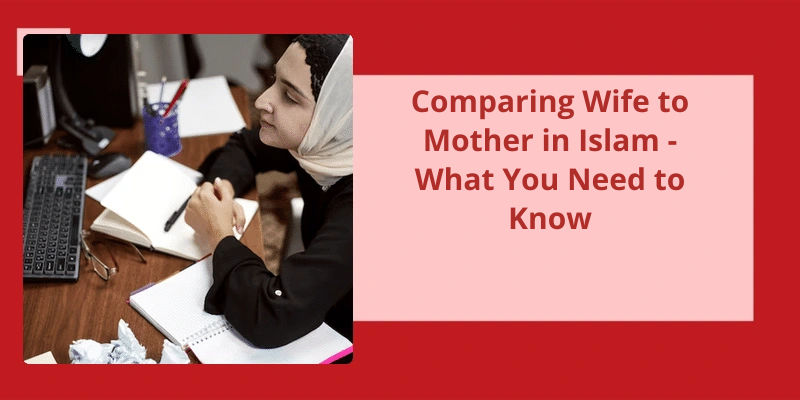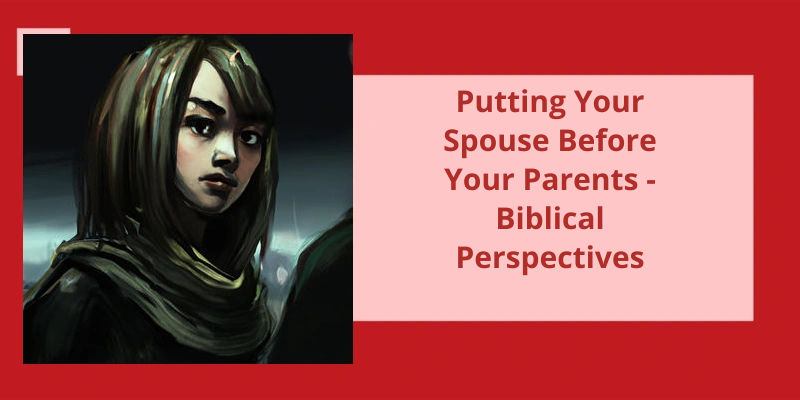In many cultures throughout history, the role of a wife and a mother has been intertwined. It’s often expected that a wife will take on the nurturing and caring roles that are typically associated with motherhood. In Islam, however, there are strict rules against comparing one's wife to their mother. Zihar, in particular, is a practice that’s considered illegal and insulting in the Islamic law. This act involves a man declaring his wife to be akin to his mother and as a result, he’s guilty of forbidding the lawful things. Zihar has been condemned in the Islamic law and is punishable by law, although it doesn’t automatically result in divorce. The reasons behind this prohibition may be rooted in the unique roles and responsibilities that wives and mothers have within Islam, and the dangers of confusing or blurring those roles. Ultimately, it’s important for individuals to understand the significance of these laws and the implications they may have for their relationships and families.
Is There a Significant Difference Between a Wife and a Mother?
When looking at the roles of a wife and a mother, it becomes clear that there are some significant differences between the two. A wife is someone who’s often seen as a partner and a confidant to her husband. She’s someone who’s there to support and encourage her husband, to be a friend, and to share in their life together. A mother, on the other hand, is someone who provides unconditional love and care to her children. She’s someone who’s there to nurture, protect, and guide her children through life.
Additionally, the expectations and responsibilities placed on a wife and a mother may vary. For instance, a wife may be responsible for maintaining the household, while a mother may be responsible for managing the day-to-day needs of her children.
Despite these differences, both roles are equally important in the family dynamic. A strong marriage is often the foundation of a happy and healthy family, and a mother plays a crucial role in ensuring the well-being and growth of her children. Both a wife and a mother must work together to create a supportive and nurturing environment for their family.
It’s also important to note that while society often places certain expectations on women to fulfill these roles, each individual woman may experience these roles differently. Some women may find that being a wife and a mother gives them a sense of fulfillment and purpose. Others may find that they prefer to focus on one role more than the other, or that they don’t fit into traditional definitions of these roles at all. Regardless of their individual experience, it’s important to validate and support the choices and experiences of all women.
Each womans experience may be unique, and it’s important to recognize and support these differences.
The Impact of Societal Expectations on Women in the Roles of Wife and Mother.
- Women are often expected to prioritize their roles as wife and mother above all else, including their own personal goals and aspirations.
- These societal expectations can lead to feelings of guilt and inadequacy when women aren’t able to fulfill them.
- Women may also face criticism and judgment from others when they make choices that deviate from traditional gender roles.
- These expectations can limit women’s opportunities and contribute to gender inequality in the workforce and beyond.
- It’s important to challenge these societal expectations and recognize the value and complexity of women’s roles beyond wife and mother.
The Bible offers many insights and instructions on the role of mothers and wives, providing guidance for women seeking to live faithfully in these important roles of life. Through passages in Isaiah and Proverbs, we find examples of strength, care, compassion, and dignity that define the character traits of a woman who’s fulfilling her calling as a mother and wife.
What Does the Bible Say About Mothers and Wives?
The Bible has a lot to say about mothers and wives, as they’re both incredibly important figures in our lives. Mothers are often the first people we turn to for comfort, and the Bible likens Gods love for us to that of a mothers love for her child. Isaiah 66:13 uses this comparison to show how God will always be there to comfort us, just like a mother would comfort her child. This verse shows us the immense love and care that mothers provide, and how that same love and care is present in Gods relationship with us.
Isaiah 49:15 asks the question, “Can a mother forget her nursing child? Can she feel no love for the child she’s borne?”. The answer is obvious: a mother can’t forget her child. This verse is powerful because it shows us the unwavering love that a mother has for her child, a love that’s so strong it can’t be forgotten. This love is also present in Gods relationship with us, as He loves us unconditionally and will never forget us.
Proverbs 31:25 is a well-known verse that describes the virtue of a wife and mother. The verse says, “She’s clothed with strength and dignity, she can laugh at the days to come.”. This verse is a reminder of the immense responsibility that comes with being a wife and mother, but also the incredible reward that comes with it. It’s a reminder that being a mother and wife is a noble calling, and that it’s something to be valued and celebrated.
They’re celebrated for their virtues and the impact they’ve on their families. Mothers and wives are the backbone of families, and they play a significant role in shaping the lives of their children and their spouses.
The Bible also reminds us that being a mother and wife isn’t just a job, but a calling. It’s a calling to love, nurture, and care for those around us, and to do so with strength and dignity. Mothers and wives are called to be servants and to put the needs of others before their own. They’re called to love unconditionally and to show compassion and grace to those around them.
They’re an integral part of our lives, and the Bible reminds us of their immense value. We can learn a lot from the virtues that mothers and wives possess, and we can strive to emulate those virtues in our own lives. Whether we’re mothers, wives, or simply appreciative of the role these women play in our lives, we can all take comfort in the wisdom of the Bible and the value it places on the women who love and care for us.
It’s a common question in marriages – should a husband put his wife before his mother? While family is important, it’s also crucial to maintain a strong bond with your partner. When one spouse continually prioritizes their parents over their significant other, it can lead to issues with trust and communication. Read on for some tips on finding a healthy balance between respecting both your partner and your family.
Should a Husband Put His Wife Before His Mother?
When a husband or wife puts their spouse before their mother, it shows a level of dedication to their marriage that’s essential for a healthy relationship. It demonstrates that the bond between the couple is stronger than the bond between the parent and child. This doesn’t mean that a husband or wife should completely disregard their mothers opinions or advice, but rather prioritize their spouses needs and wants.
One of the key elements of a successful marriage is open and honest communication. When a wife constantly seeks counsel from her parents before discussing important issues with her husband, it can create a rift of mistrust. The husband may feel that his opinion doesn’t matter and that he’s not a priority in his wifes life. This can lead to resentment and a breakdown in the marriage.
Respecting your spouse and valuing their opinions is essential in a marriage. This can create a sense of comfort and security for the wife, knowing that her husband has her best interests at heart. It also shows a level of maturity and emotional intelligence on the part of the husband, which can inspire admiration and affection from his wife.
In some cultures or families, it may be difficult for a husband to put his wife before his mother. However, it’s important to remember that a husbands first priority should be his immediate family. This means that his wife and children should come first, and his parents should come second. This can be a difficult transition for some families, but it’s essential for the health of the marriage.
This biblical teaching has been widely discussed and debated among scholars and believers alike, with some interpreting it as a call for husbands to prioritize their wives over their mothers, while others argue that it simply emphasizes the importance of the marital bond and unity. Nonetheless, examining this verse and related passages can shed light on important principles and values that underlie Christian teachings on marriage and family.
What Does the Bible Say About Wife Coming Before Mother?
Therefore, the Bible doesn’t explicitly state that the wife should come before the mother, but it does emphasize the importance of leaving ones parents in order to cleave to their spouse. This passage highlights the significance of the marital relationship and the spiritual unity that it represents.
Throughout the Bible, there are also numerous examples of wives who demonstrate loyalty and devotion to their husbands above all else. For instance, Ruth famously declares to her mother-in-law, “Don’t urge me to leave you or turn back from following you; for where you go, I’ll go, and where you lodge, I’ll lodge. Your people shall be my people, and your God, my God” (Ruth 1:16). This passage shows how a wifes commitment to her husband should outstrip her loyalty to her family of origin.
Similarly, Proverbs 31 describes a virtuous wife who’s praised for her hard work, resourcefulness, and wisdom. This passage illustrates how a wife can be a vital and indispensable partner to her husband, fulfilling a range of roles within the household and beyond. The wife in Proverbs 31 isn’t subordinate to her husband, but rather an equal contributor to their shared life together.
In addition to these examples, the Bible also stresses the importance of love and respect within marriage. In Ephesians 5, Paul writes, “Husbands, love your wives, just as Christ also loved the church and gave Himself up for her. . Nevertheless, each individual among you also is to love his own wife even as himself, and the wife must see to it that she respects her husband” (Ephesians 5:25, 33). This passage underscores the mutual responsibility that husbands and wives have to care for and uplift each other.
Overall, while the Bible doesn’t explicitly prioritize the wife over the mother, it does offer a comprehensive vision for what a healthy and thriving marital relationship should look like. By honoring and cherishing their spouses, husbands and wives can create a loving and fulfilling partnership that transcends traditional family loyalties.
How Should a Wife Handle Conflict Between Her Mother and Husband?
This article discusses some practical steps that a wife can take when she finds herself caught in the middle of a conflict between her mother and husband. The focus is on open communication, setting boundaries, and finding ways to accommodate both parties without compromising her own sense of peace and well-being. Key strategies include active listening, clear communication, and seeking outside support from friends, family, or counseling professionals as needed. Ultimately, the goal is to find a way to resolve the conflict in a respectful and constructive manner that promotes harmony and unity within the family.
Conclusion
Zihar is an insult to the wife and disrespectful not only to her but also to the sanctity of marriage. The Islamic law prohibits such actions and denounces them as sinful, highlighting the importance of treating one's wife with respect and dignity. Ultimately, it’s essential to recognize and uphold the value of marriage in Islam, which is based on mutual love, affection, and respect between two individuals.






